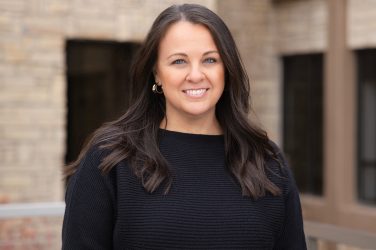
Q&A
Counselor/Therapist
Do you find the conversation around mental health is healthier than in the past?
We’ve definitely come a long way toward breaking the stigma associated with mental health. Adolescents today seem to realize it’s okay to take a pause and focus on yourself. They feel more comfortable talking to their friends and schoolmates about their mental health struggles. While there are still some barriers, they don’t worry about being labeled the way their parents or other adults often do.
How can parents help in that process?
A good start is trying to have more conversations with your kids about how they’re feeling. We’re all so busy that it can be easy for conversations with our kids to become superficial. Maybe you can find a show to watch together then talk about it afterward. There are apps that help open dialogues with conversation starters. A peripheral activity like cooking together can relieve some of the stress of talking and help them open up about how they’re feeling and what they may be struggling with. Since kids and adolescents like being on their phones, find games you can play together on the phone. And there’s a card game called “We’re Not Really Strangers” that gives families conversation topics to discuss around the dinner table. These and other tools can help break down the walls and make conversation easier.
What are the benefits of group therapy?
Many adults and kids feel alone in their mental health struggles. Talking about their struggles in a group and listening to others talk about their own shows them there are other people who are wrestling with the same things. School is such a different place compared to when you and I went to school. It’s easy for kids to feel isolated at school. But those same kids often come out of their shell in group therapy as they build their confidence. They realize, “I’m okay. I can do this.” The hope is that they bring that newfound confidence with them into school and into the rest of their lives.
How are kids still being affected by the COVID shutdown year?
That time of isolation affected their socialization and their ability to read social cues. If a child was experiencing emotional abuse or neglect, they didn’t have a reprieve to get out and be with their friends and get away from the situation. For a lot of kids, that time really stunted the way they interact with others and was responsible for an increase in social anxiety when we were suddenly exposed to large crowds, noise, and social interaction again.
Tell us about your front line program.
We operate a group for veterans and first responders which is facilitated by a veteran. It truly helps this population to be in a room with others who’ve experienced similar things and are working through similar struggles. We use a variety of modalities, really whatever works best for that individual group. We’re seeing promising results and look forward to expanding the program.
About The Expert

Jessica Marcinko, MSW
Connections Wellness Group - McKinney
As a program therapist at Connections Wellness Group, Jessica provides child and group therapy services to clients with various mental health needs. She applies her master’s in social work in the mental health field working with children, adolescents, adults, and seniors in settings such as hospitals, dialysis centers, and community agencies.










